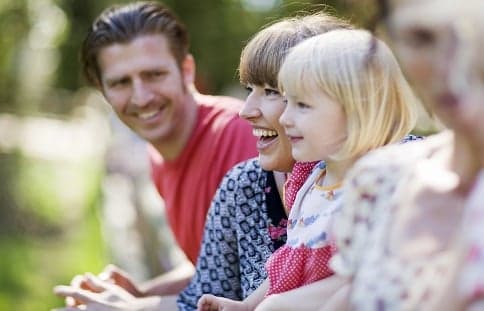Getting pregnant the Swedish way
March 22nd is the most common birthday in Sweden – nine months after the Midsummer holiday. Coincidence? Probably not. The Local takes a look at fertility the Swedish way – both Viking and modern methods.

Since pre-Christian times, Scandinavians have celebrated the summer solstice in the most decadent of ways. Vikings observed the holiday as early as the 10th century. It was the height of summer, the longest day in a land where sun can be scarce.
And at Midsummer, symbols of fertility abound – not least of all in form of the Maypole.
According to tradition, the Maypole, with its two small hoops hanging on either side, is lavishly decorated with greenery and flowers, and young women wander in silence to pick seven kinds of flowers dream of their future husbands.
Vikings may be a thing of the past, but the Swedish midsummer celebration lives on – as does the holiday's unprecedented fertility. Rumour has it that Swedes are friskier than ever during the holiday, but Swedish startup and birth control app NaturalCycles decided to put it to the test.
More Swedes are born on March 22nd than on any other one day, and as it turns out, the data from NaturalCycles matches up.
Users had less intercourse in June on average than they did in May - but the weekend of Midsummer was a clear exception, with a clear rise in sex and a 25 percent increase in the number of pregnancies that weekend.
"The celebratory spirit lives on," co-founder Elina Berglund declares.
"The data shows that even though frequency is below average, Swedes planning a pregnancy do in fact have more sex on Midsummer’s day and the June Solstice, with a good percentage of these resulting in a pregnancy."
Click to enlarge:
Do Swedes really have more sex on Midsummer? Click to see the full infographic
But nowadays, women don't have to rely on pagan fertility symbols and flowers under their pillow when they're trying to get pregnant.
Natural Cycles is an app which helps women to plan and monitor their pregnancies (as well as avoiding unwanted pregnancies). Users take their temperature each morning and enter the data into the app, which provides information on which days they are most fertile.
"Some women still have misconceptions about fertility, such as that you can only get pregnant on your day of ovulation, or that you can get pregnant at any time," Berglund says. "NaturalCycles teaches women to get to know their own bodies so you know your cycle and when best to try."
There are 2-3 days per cycle when a woman has the highest chances of conceiving, which land just before ovulation day. By analysing a woman's basal body temperature (BBT) readings and Luteinizing Hormone (LH) levels (optional) the NaturalCycles algorithm can find ovulation day and the days she is most likely to get pregnant to increase her chances of conception.
Read also: 'Swedish women must demand condom use'
However, the app is more than a fertility tracker as it can also detect when a user has become pregnant as well as monitor the health of a fetus in the first trimester.
”NaturalCycles automated features can detect early signs of miscarriage,” Berglund says. ”The app recently saved a pregnancy by notifying a woman to seek medical advice after detecting insufficient progesterone levels that weren't enough to support pregnancy in her first trimester.”
That's why Berglund recommends that users keep using the app and taking their temperature even after they are successfully pregnant.
But whatever way you choose – pagan Maypoles and flowers or modern science and data tracking – NaturalCycles makes it easier to follow a pregnancy from conception to birth.
“On average it takes just three months to get pregnant with NaturalCycles compared to the average six months when you try without," says Berglund, who is herself a mother thanks to the planning app.
“And apparently, Midsummer is still the hottest time to try!”
This article was produced by The Local in partnership with NaturalCycles.
This content was paid for by an advertiser and produced by The Local's Creative Studio.

.jpg)
Join the conversation in our comments section below. Share your own views and experience and if you have a question or suggestion for our journalists then email us at [email protected].
Please keep comments civil, constructive and on topic – and make sure to read our terms of use before getting involved.
Please log in here to leave a comment.